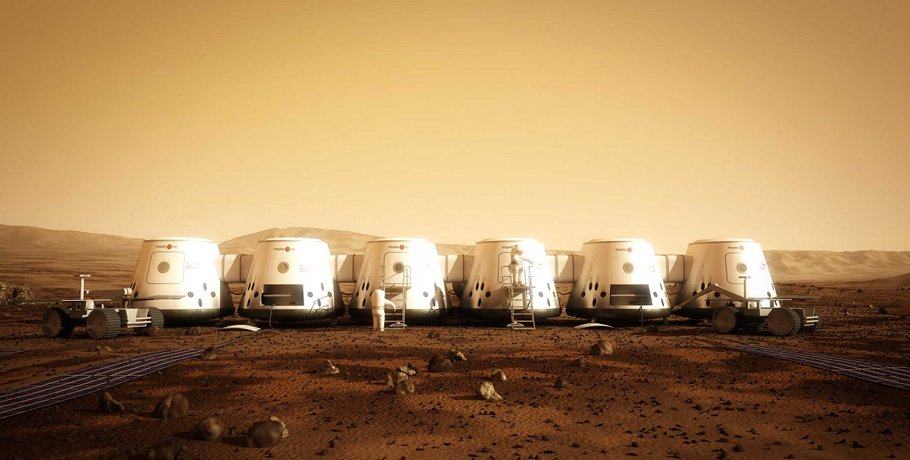Mars One: The Martian Chronicles or Big Brother Live on Mars?

This week we have seen beautiful Venus transiting directly between the Earth and the Sun, which brought plenty of the media attention, and yesterday one of the greatest science fiction writers Ray Bradbury died during Venus transit. He was best known for his dystopian novel Fahrenheit 451 and for the science fiction stories collection The Martian Chronicles. Both the Earth and Mars lost one of their most famous citizens.
Speaking of Venus, Mars, science fiction and non-fiction, I want to share something with you that a colleague of mine drew the attention to, the other day. It is a private space start up from the Netherlands called the Mars One project, whose goal is to send four volunteer astronauts on a one-way journey to Mars. Take a look at the promotional video to get the sense of this endeavor.
The idea of the privately financed Dutch company is to establish the first human colony on Mars by 2023. ‘’A habitable settlement will be waiting for the settlers when they land. The settlement will support them while they live and work on Mars the rest of their lives.” And this is not all! A new team will make the journey to the Red Planet every two years, enabling the colony to grow. “Every two years after 2023 an additional crew will arrive, such that there is a real living, growing community on Mars. Mars One has created a technical plan for this mission that is as simple as possible.”
Mars One has developed a roadmap to Mars made up of various stages of the plan (here summarised), each stage bringing to the final goal: the first four people on Mars in 2023. One of the steps is to first send rovers in 2018, which will travel around the planet to determine the most favorable location for the settlement and then build out living units. After that, on a very specific date of September 14, 2022, the Mars One will launch its first four astronauts, take a transit habitat for the seven-month trip to Mars and settle in to their new home. The intention is that the crew lives on the planet for the rest of their lives. Every two years after that, another group will join the settlement to populate the colony.
My major concern is if this endeavor is seriously possible, and is it ethical?
A few private investors for this project, the team, suppliers (all private aerospace companies), and the project ambassadors including prof. dr. Gerard ‘t Hooft, who won the Nobel Prize for physics in 1999, seem to be serious. How much serious – time will tell.
As an academic, science communicator and social media analyst, I would like to be convinced with more data, a specific and detailed plan, and more humanized and ethical background for this endeavor. Maybe this project is technically and logistically possible. One of the Australian Science writers, an astro-physicist will cover this topic in a more technical and research context soon.
My question at the moment is not purely technical or material. It is the question of the ethics that I am concerned with the most, aside from the fact that NASA so far hasn’t supported this plan, and that as astronauts and scientists reported earlier this year to the BBC Future, there is an intense radiation on Mars and technical barriers to overcome.
When one of the Mars One co-founder Bas Lansdorp made a comment in the video about the funding the project, these two words set up the red alert immediately: ‘media spectacle’, adding: “We will finance this mission by creating the biggest media event ever around it. (…) Everybody in the world can see everything that will happen in the preparations and on Mars.”
The idea of the Big Brother is not new, especially now when we live in the new media landscape of the surveillance practiced by default. Many countries on the planet Earth are fighting against the real time and cyber surveillance and privacy invasion issues. I also have in mind that the volunteers won’t be able to return to Earth because they are going to spend the rest of their lives on Mars. Are we reaching the final phase in the human civilization to watch our fellows living and dying on the fourth rock from here, sitting remotely in our homes, watching live every step they make, enjoying omni-present voyeurism that already exists on Facebook and other social media places? Or will we take care of our lives and our near surrounding, clean villages, lessen many globally present social and digital inequalities, and take care of online and offline habitats for better (media) eco systems?
There are many unanswered and unexplained problems that are factual, and I hope that the scientists and professionals in different space and astronomic fields will address them in the near future.
I would like to hear your opinion about this project and if you think it is doable and ethical? Will our future generations read The Martian Chronicles or will they rather watch The Martian Chronicles space TV online directly from the Red Planet?
Radovanovic D (2012-06-07 13:39:52). Mars One: The Martian Chronicles or Big Brother Live on Mars? . Australian Science. Retrieved: Feb 10, 2026, from https://ozscience.com/space/mars-one-the-martian-chronicles-or-big-brother-live-on-mars/
 Follow
Follow
The idea interests me, at least in principle. Personally, I’m still undecided on whether or not they’ll actually be able to go ahead with it. Though if nothing else, the fact that the idea is being talked about might serve to enthuse people about space exploration – Even though most of the opinions on the internet are fairly negative so far!
Thank you for the comment! I agree with you: I do not want to be a sceptic, but definitely there are some issues to be clarified and resolved around this project. Time will tell for sure, let’s see what happens.